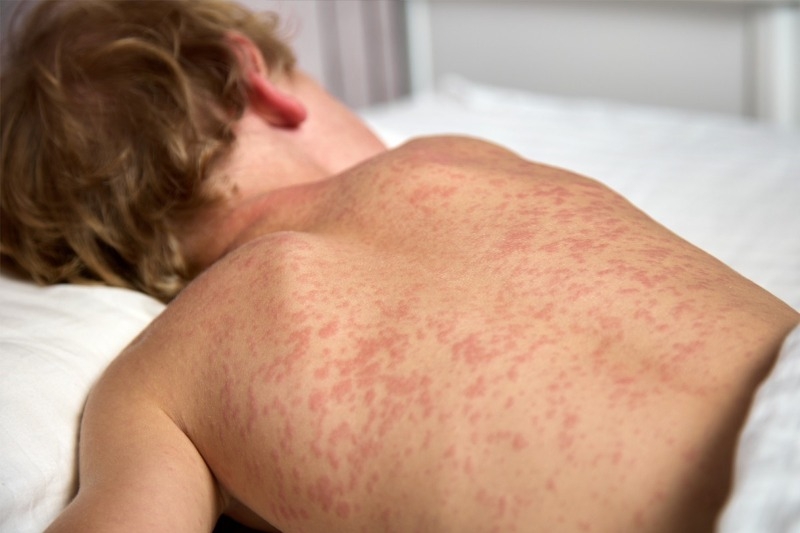Measles Isn’t Just a Little Rash
June 06, 2025
Early last week we had news of the first confirmed case of measles in Nebraska. The case was in Sheridan County. For those of us in south central Nebraska, what should we know about measles?
First, we have NOT had any confirmed cases of measles in south central Nebraska (our health district includes Adams, Clay, Nuckolls, and Webster counties). However, nationwide, there are 34 states reporting confirmed cases of measles and a total of more than 1,150 laboratory-confirmed cases, as of June 3, 2025. We also know that 96% of the patients with measles are un-vaccinated or not fully vaccinated. In addition, 12% of the people diagnosed with measles have required hospital care, with the highest complication rates occurring in children less than 5 years old. Three people have died, including 2 children.
Measles isn’t just a little rash: measles can cause severe illness. There are steps you can take to protect yourself and your family.
What is measles and how does it spread?
Measles (also called Rubeola) is caused by a virus that spreads easily through the air and can settle on surfaces. Measles can live for up to 2 hours after an infected person leaves an area. Breathing the air or touching an infected surface, then touching your eyes, nose, or mouth, can result in measles infection.
It usually takes 7-14 (and up to 21) days after contact with the virus for symptoms to appear. Measles symptoms include:
- High Fever (could be more than 104 degrees F)
- Cough
- Runny Nose
- Red and/or Watery Eyes
- A Rash (which appears 3-5 days after other symptoms begin)
Most people recover in about 10 days. However, people infected with the measles virus can spread the virus to others during their contagious period. The contagious period is from the time when you first have symptoms (about 4 days before the rash), until 4 days after you get the rash.
Measles is the most contagious illness we know about: if you have measles, up to 90% of the people close to you, who are not immune, will also become infected.
Why is measles such a concern?
Measles can be especially dangerous for babies, young children, and people with severely weakened immune systems. Measles can cause severe health complications, including pneumonia (lung infection) and swelling of the brain (encephalitis).
- 1 out of 5 people who get measles will be hospitalized
- 1 out of every 20 children with measles will get pneumonia, the most common cause of death from measles in young children
- 1 out of every 1,000 people with measles will develop brain swelling, which may lead to brain damage.
- As high as 3 out of every 1,000 people with measles will die.
If you are pregnant and not immune, the risks of complications from measles are higher for both mom and baby, including: miscarriage, premature labor, low birth weight, and maternal death due to other complications, like pneumonia. Infection in mom near the end of pregnancy can lead to severe respiratory complications for baby, after birth. And, measles infection in mom can be transferred to the newborn.
What steps can I take to protect myself, my family, and my community from measles?
#1 - Make sure all children and adults in your household are up to date on ALL of their recommended vaccinations. The MMR (Measles, Mumps, Rubella) vaccination provides safe and long-lasting protection against measles. In fact, 2 doses MMR vaccine are 97% effective at preventing measles illness, if exposed to the virus, while 1 dose is about 93% effective.
For children who are too young to be vaccinated or who can’t get the vaccine for medical reasons, take precautions such as:
- limiting your baby’s exposure to crowds and other children, and keeping your child away from anyone with a fever, cough, cold, or other respiratory symptoms
- making sure your family washes hands regularly
- avoiding travel to places where measles regularly spreads or where there is a measles outbreak
- prior to travel, asking your healthcare provider about other protection options
What should I do if someone in my family has been exposed to measles or might be infected with measles?
Immediately call ahead to your healthcare provider and let them know you think you were exposed to someone who has measles, or let them know about any symptoms you may be experiencing. They will want to make sure they don’t put medical office staff and other patients at risk, and they will recommend next steps to protect yourself and others.
What is our local health department doing to prepare for local measles cases?
South Heartland District Health Department is monitoring the National and State measles situation and sharing up-to-date information with the public. We are assuring that our local health providers have access to the most current guidance for evaluation and testing of their patients. We are advocating for adequate supply of MMR vaccine locally and tracking where vaccine is available in our four counties. And, we are working closely with the Nebraska Department of Health and Human Services and surrounding local health departments - preparing for a rapid, coordinated response, in the event we have a confirmed case in our district. Watch for notifications and updates on SHDHD’s website: southheartlandhealth.ne.gov.
##
Michele Bever is the Executive Director for South Heartland District Health Department, serving Adams, Clay, Nuckolls and Webster Counties in Nebraska. She may be reached at 402-462-6211.


 Launch the media gallery 1 player
Launch the media gallery 1 player